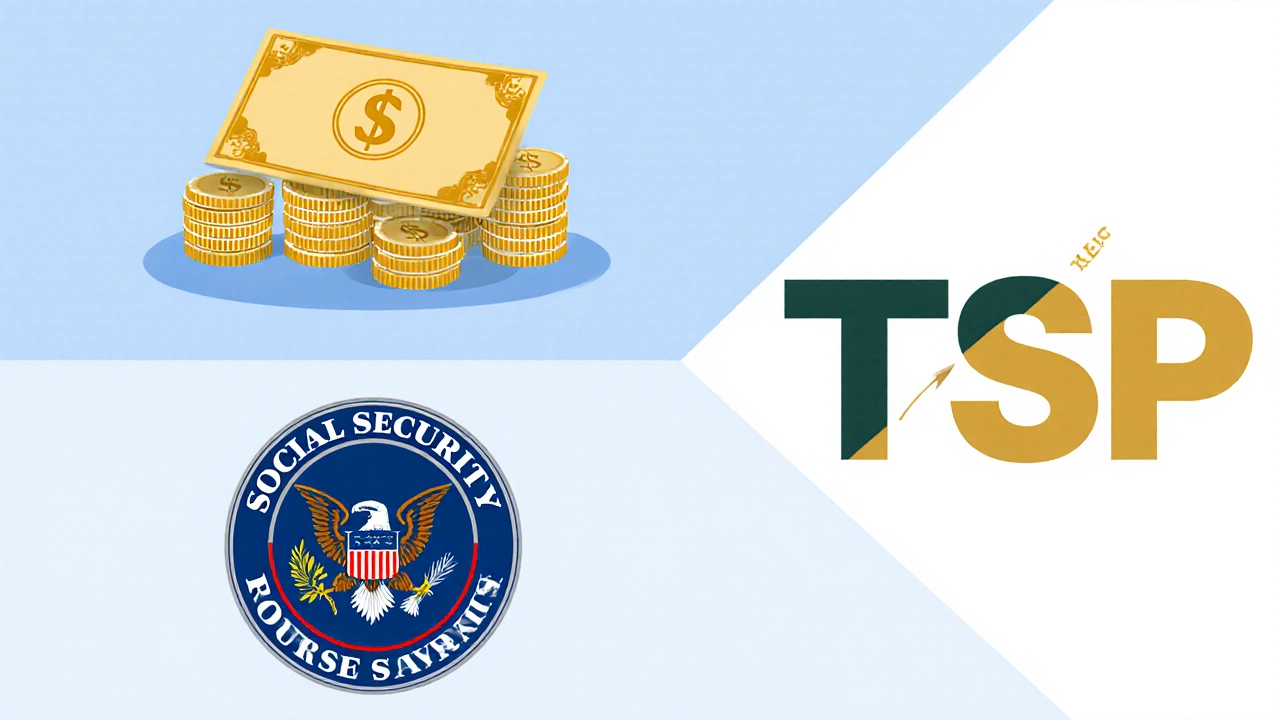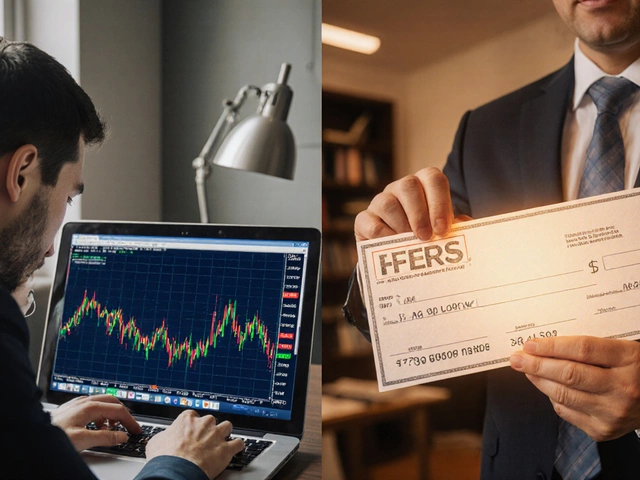Government Pension Calculator
Calculate Your Pension
Estimated Retirement Income
Monthly Pension Estimate:
Based on 1.1% of final salary per year of service
When you hear government jobs, you might think of job security, steady pay, and a comfortable retirement. But if you’re coming from the private sector, you might be wondering: do these jobs offer 401(k)s like private companies do? The short answer is no - not in the way you’re used to. Government jobs don’t use 401(k) plans. Instead, they offer something different, and for many people, it’s even better.
What Is a 401(k), Anyway?
A 401(k) is a retirement plan offered by private employers in the U.S. You contribute a portion of your paycheck before taxes, and your employer might match some of that money. The money grows tax-deferred until you withdraw it in retirement. Many private-sector workers rely on this system - but it’s not the only way to save for retirement.
Government jobs, especially at the federal, state, and local levels, don’t use 401(k)s. They use retirement systems built by law, not by individual employers. These systems are designed to be more stable, predictable, and long-term than 401(k)s, which depend on market performance and how much you personally save.
What Government Jobs Actually Offer: The Civil Service Retirement System
If you work for the federal government in the U.S., your retirement plan is likely the Federal Employees Retirement System (FERS). FERS isn’t a 401(k). It’s a three-part system:
- Basic Benefit Plan - This is a defined benefit pension. You get a monthly payment for life after retirement, based on your years of service and your highest three years of salary. For example, if you work 30 years and retire at 60, you’ll get about 30% of your highest salary every year, forever.
- Social Security - Unlike some older government workers, most FERS employees pay into Social Security and qualify for those benefits too.
- Thrift Savings Plan (TSP) - This looks like a 401(k), but it’s not. It’s a government-run retirement savings plan with very low fees. You can contribute up to $23,500 in 2025, and if you’re over 50, you can add an extra $7,500. The government matches up to 5% of your salary - dollar for dollar on the first 3%, and 50 cents on the dollar for the next 2%.
That’s right - the government matches your savings. And unlike many private employers who match 3% or less, federal jobs match up to 5%. That’s a huge boost.
State and Local Government Jobs: Different Rules, Same Idea
State and local government jobs - like teachers, police officers, firefighters, and city clerks - don’t use 401(k)s either. They have their own pension systems, often called defined benefit plans. These vary by state and even by county.
In California, for example, teachers retire with a pension based on their final salary and years worked. A teacher with 30 years of service might get 90% of their last salary annually. In Texas, the Teacher Retirement System (TRS) works similarly. In New York, the New York State and Local Retirement System (NYSLRS) does too.
Some state jobs also offer optional 401(k)-style accounts - but they’re secondary. The main retirement income comes from the pension, not from your personal savings.

Why Government Pensions Are Different - and Often Better
Here’s the key difference: a 401(k) is a gamble. If the market crashes right before you retire, your savings can shrink. If you don’t save enough, you run out of money. Many private-sector retirees now work part-time in their 70s just to get by.
A government pension is not a gamble. It’s a contract. You get a fixed monthly check for life, no matter what the stock market does. It’s adjusted for inflation in most cases. You don’t have to manage investments. You don’t have to worry about fees eating into your savings. You just get paid.
Let’s say you earn $70,000 a year and work for 30 years in a federal job. Under FERS, you’ll get about $21,000 a year from your pension - and that’s before Social Security or your TSP savings. That’s $1,750 a month, guaranteed, for the rest of your life. Add Social Security and your TSP, and you’re looking at a solid retirement income without ever touching a stock market app.
What About Private Sector Workers Who Switch to Government Jobs?
If you’ve worked in the private sector and are thinking of switching to a government job, you might have money in a 401(k). You can roll that money into your TSP. The TSP accepts rollovers from 401(k)s, IRAs, and other qualified plans. That lets you consolidate everything into one low-cost account.
But don’t close your 401(k) without checking the rules. If you’re under 59½, early withdrawals can trigger penalties. Rolling it over is usually the smart move.
What If You Work Outside the U.S.?
If you’re reading this from India, Canada, the UK, or elsewhere, the rules are different. In India, government jobs offer the New Pension System (NPS), which is a defined contribution plan - more like a 401(k) than a pension. You contribute, the government matches part of it, and you invest the money in funds. At retirement, you get a lump sum and a monthly annuity.
In Canada, federal workers get the Public Service Pension Plan, which is a traditional defined benefit pension - similar to FERS. In the UK, public sector workers get the Civil Service Pension Scheme, which is also a defined benefit plan.
So if you’re thinking about government jobs globally, the answer isn’t universal. But in the U.S., it’s clear: no 401(k). But something better.

Why This Matters for Your Career Planning
If you’re preparing for government exams - whether in the U.S., India, or elsewhere - understanding retirement benefits is part of the decision. A 401(k) requires discipline, financial knowledge, and market luck. A government pension requires nothing but time and service.
Many young professionals chase high salaries in tech or finance, thinking they’ll save enough for retirement. But the reality is, most people don’t save enough. They spend. They get distracted. They forget. Government jobs take that pressure off. You don’t have to be a financial expert to retire well.
That’s why millions choose government jobs - not just for the pay, but for the peace of mind. You know exactly what you’ll get when you retire. No surprises. No stress. Just a steady check.
Key Takeaways
- Government jobs in the U.S. do not offer 401(k) plans.
- They offer defined benefit pensions - guaranteed monthly income for life.
- The Thrift Savings Plan (TSP) is the government’s version of a 401(k), with better employer matching.
- State and local jobs vary, but most still rely on pensions over personal savings plans.
- Retirement in government jobs is more secure, predictable, and less dependent on market swings.
Frequently Asked Questions
Do all government jobs in the U.S. offer pensions?
Almost all federal, state, and local government jobs in the U.S. offer some form of pension. Federal workers get FERS, state workers get state-specific pensions, and most local jobs like police or teachers have their own retirement systems. A few very small municipalities may only offer TSP or similar plans, but pensions are the norm.
Can I have both a 401(k) and a government pension?
Yes, but only if you worked in the private sector before joining government service. You can roll your old 401(k) into the TSP. Once you’re in a government job, you won’t get a 401(k) - but you’ll get a pension and TSP instead. You can contribute to both the TSP and your private 401(k) if you hold both jobs at the same time, but that’s rare.
Is the Thrift Savings Plan (TSP) better than a 401(k)?
For most people, yes. The TSP has lower fees than almost any private-sector 401(k). Its expense ratios are as low as 0.025%, while many 401(k)s charge over 1%. The government also matches up to 5% of your salary - which is higher than most private employers. Plus, you get access to the G Fund, a unique government bond fund that guarantees principal and pays interest.
What happens to my pension if I leave government service early?
If you leave before retirement age but have at least 5 years of service, you can still claim your pension later. For federal workers under FERS, you can apply for deferred retirement at age 62 (or 60 with 20 years). You won’t get the pension until you reach that age, but your benefits are locked in. You can also roll your TSP into an IRA if you leave.
Do government pensions keep up with inflation?
Yes, most do. Federal pensions under FERS get cost-of-living adjustments (COLAs) based on the Consumer Price Index. State pensions vary - some adjust fully, some partially, and a few don’t adjust at all. But overall, government pensions are far more likely to protect your buying power than private 401(k)s, where inflation risk falls entirely on you.


